Photographs: Mohsin Raz/Reuters
The startling revelation by Pakistan's former foreign minister Shah Mehmood Qureshi that Raymond Davis, who allegedly killed two Pakistani citizens, does not enjoy blanket diplomatic immunity could lead to the conviction of the American national.
Under such circumstances, paying Diyya (blood money) to the victims' families may be the only way for Davis, who has been charged for the murders under Pakistani law.
Two Pakistanis -- Faizan Haider and Muhammad Faheem -- were shot and killed by Davis in Lahore on January 27. A third, Ubaidur Rehman, was killed by a car that was on its way to rescue Davis.
Davis had told investigators that he acted in self-defence after the two armed men tried to rob him. Police officials in Lahore had earlier said evidence gathered by them suggested the dead men were robbers. A case has also been filed for a robbery allegedly committed by the two men shortly before they were killed.
Reportage: Tahir Ali in Islamabad
Diyya is an expensive affair
Image: A mock execution being staged during a protest against Raymond Davis in PakistanPhotographs: Athar Hussain/Reuters
The case of Raymond Davis is getting more complicated with each passing moment. So far, immense pressure by the US administration on Pakistani authorities to hand over Davis seems to have failed.
During his recent visit to Pakistan, US Senator John Kerry met various Pakistani officials but failed to convince them about repatriating Davis. Media reports say that acting on Kerry's directions, different sources approached the families of the victims and urged them to accept Diyya and forgive the killer.
Under Islamic law, the compensational amount paid to the family members of a victim is called Diyya. It is an Arabic word which means both blood money and ransom. Diyya is an expensive affair and it is not easy for a common man to pay such a high price.
The blood money is paid by the killer or his family
Image: US consulate employee Raymond Davis is escorted by police and officials out of a Pak courtPhotographs: Tariq Saeed/Reuters
Davis will be let go if the families accept the Diyya, otherwise he may face life imprisonment or death sentence if convicted by the Pakistani court.
In earlier times, the Diyya was paid in kind, in the form of goods or animals rather than cash. But according to the Shariah, the Diyya should be paid in cash to avoid possible fraud on the part of the culprit. The blood money as a fine is paid by the killer or his family to the family or tribe of the victim.
There is no specific amount prescribed for Diyya and the Quran leaves its quantity, nature and other related issues to the customs and traditions of a society.
'We will only accept blood for blood'
Image: Supporters of the Jamaat-e-Islami take part in a protest rally against Raymond Davis in PeshawarPhotographs: K Parvez/Reuters
The Pakistan government is fearful of a severe backlash from the public if it agrees to hand over Davis to US authorities. At the same time, it doesn't want to antagonise its superpower ally by prosecuting one of its citizens. Diyyat (plural for Diyya)may be the only way out for Davis as well as the Pakistan government.
According to sources, the victims' families are being urged to accept the blood money, but they have not agreed to do so yet.
Imran Haider, the eldest brother of Faizan Haider, said on Wednesday, "We will only accept blood for blood. He (Raymond) should be tried in Pakistan and sentenced to death here. He has killed our innocent brother and we will seek his death for this crime."
'Raymond Davis's trial should be held in Pak'
Image: Family members comfort the sister of Shumaila, who committed suicide after her husband was killedPhotographs: Fayyaz Hussain/Reuters
Shumaila, the widow of Muhammad Fahim, one of the two civilians shot dead by Davis, has already committed suicide after taking poisonous pills. Her final message had been "We want blood for blood."
Incidentally, Faizan's mother sought the release of Dr Aafia Siddiqui, a Pakistani scientist facing charges of attacking US forces in Afghanistan, in exchange for Davis's freedon.
Sajjadur Rehman, the brother of Ubaidur Rehman, said, "Raymond Davis's trial should be held under the Anti-Terrorism Act (of Pakistan). Releasing Dr Siddiqa in exchange for Davis is not acceptable as she is innocent. She was forcibly incriminated in terror activities by US forces."

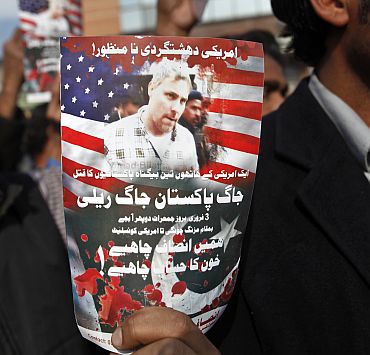
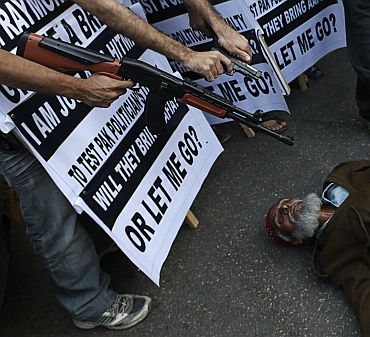
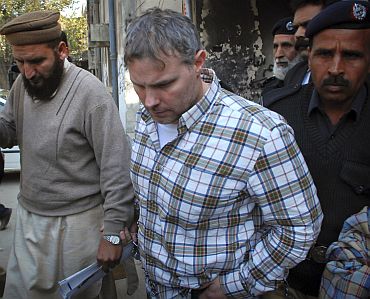
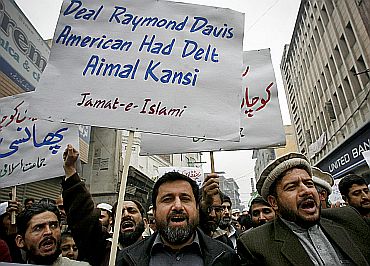
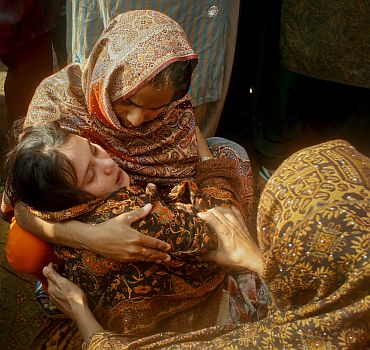
article